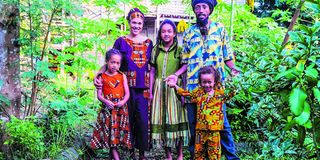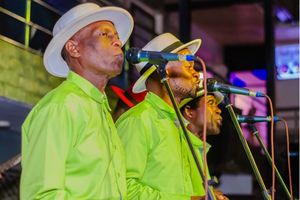Ras Mambo- advocating for an alternate lifestyle

Everyone has different idea of what an alternative life style is because throughout the years groups of people have been opting from what people perceived to be normal and decide to conduct themselves in what the general mass points out to be outside cultural norms.
An alternative lifestyle is often the display of different statements made practical by practicing a certain way of living.
History shows that worldwide one of the first and original most spoken about alternative lifestyle was the flapper in America where women led a free unconventional lifestyle which was symbolized by them cutting their hair and wearing short skirts and dresses as well as drinking and dancing to music in public spots freely without worries over the scandals that may follow them.
There are so many alternative lifestyles worldwide a few examples being; child rearing such as home schooling and home birthing, restrictive dieting such as veganism, freeganism, raw foodnism, body modification such as tattoos and body piercing and simple living such as Bohemianism.
Worldwide there are said to be over 10,000 eco-villages and in Tanzania the trend is finally picking up steam in urban areas. The modern eco-village is brought up mostly with the demand of people seeking for an eco-friendly atmosphere of living and as well an escape from the impact of various pollution such as industrial and noise pollution.
Eco-villages and an eco-friendly lifestyle
For this day and age an eco-village is an essentiality and is one of the best ways of living that can be adopted to positively curb climate change. Simply put, an eco-village is made up of a community of people who strive to integrate a supportive social environment that holds a low impact way of life.
Eco-villages usually consist of people who share ecological, social-economic and cultural-spiritual values.
Hugo Mambo and his wife Rita Jacinta who famously goes by the name Mama Negesta started an eco-village known as ZioZuri Art and a cultural eco-village at the Geza Ulole area in Kigamboni 15 years ago.
Their homestead has opened doors for their Rastafarian community and the Geza Ulole community at large. In the ZionZuri eco-village, they practice the Rasta way of living and are conscious of their environment as well.
Despite living in ZionZuri for 15 years and the town of Geza Ulole growing rapidly around the, this homestead is still a home to many different species of plants and many other living organisms that do not particularly harm man.
Hugo Mambo (a.k.a Ras Mambo)
Hugo Mambo who is famously known as Ras Mambo or Mkush (Kushite) by the people of Geza Ulole, is a 42 year old father of 3. He has two girls namely Negesta Mambo, Nazareth Mambo and a son, Negusi Mambo.
Ras Mambo’s Rastafarian journey started in 1993 after he finished his primary school and his family made the decision to bring him back to Dar to complete his secondary education.
His passion for Rastafarianism drew him towards reggae music often listening to Bob Marley and many other reggae artists. He loved the peace messages that were carried in the reggae music as well as their look which was symbolized by their dreadlock’s hairstyle.
Ras Mambo held this secret within him because no one around him was interested in that lifestyle.
After form four, Ras Mambo dedicated his effort to supporting his father’s business. He did it so well that when an opportunity to go for the youth festival in Portugal came by, his father offered to pay for him and his brother.
While in Portugal, when everyone was returning home, Mambo chose to stay back so he can lead the Rastafarian lifestyle.
In Portugal life was not what he assumed it would be. He was lucky to have been hosted by an Angolan but at some point, Ras Mambo had the prodigal son’s experience.
His host lived in the most unfavourable areas of Portugal. “One day as I lay down on the mattress, I asked myself, what life is this? I led a great life in my father’s house hold, I drove a car and had everything I wanted, what am I doing here now?”
He eventually was given an ultimatum by his host that if he wanted to stay, he had to seek work and this was not easy because Ras Mambo was there illegally. With his host’s assistance, he eventually got a construction job and fruits picking jobs. He made great friendships, eventually learned the language and wrote a letter and communicated back to his parents after a year.
Ras Mambo was the vocalist of a band he and some pals formed. A year later, they decided to search for female vocalists so as to grow the band. He was homesick and as time went by,it worsened.
“Jobs became scarce, life was not getting easier and I had all the reasons to go back home. I therefore made a decision that I am going to say goodbye to the band and leave for Tanzania” he narrates. As he bid the band goodbye, Rita who is now mama Negesta said to him in a friendly way that she wanted to come to know my country.
Rita was working at the university and she asked if it were possible for him to wait three months so they can return together which he agreed to.
During this waiting period, they got close and developed a relationship, she eventually introduced him to her family and he sent photos back home to inform his family that he met a lady and will return with her and in 2005 December they flew back to Tanzania. “We arrived at the family home and we were happy to reunite with the family, I took my girlfriend around; I took her home to Kilimanjaro and in several national parks until eventually we returned back to Dar in January.”
His father gave him a roadside plot and since they are a business-minded family, he quickly decided to invest in cultural and traditional merchandise. Ras Mambo’s father also gave them a plot as a part of their tradition so that they can build a home together.
In December his inspiration was catalyzed by their attendance of Sauti za Busara event where he learned of the Rasta presence in Tanzania and the cultural and tradition merchandise being displayed. “As we returned, we decided that we will set up the business while she looked for work at the port as a marine biologist whish sadly was not successful and therefore decided that since we are going to create merchandise; acquiring sewing skills will come in handy”.
Rita then joined a sewing school in Manzese as Ras Mambo oversaw the construction of their shop.
One day they received a letter from TANROAD that required them to take down the shop, but they brushed it off until the expansion of the road by TANROAD took place.
One Sunday morning as he was resting at home, a young man rushed to his house and informed him that his shop was down and people were about to pick it apart.
Ras Mambo acted fast and collected every part of his shop and gathered them outside his father’s home. “The pain at this point was enormous but luckily I was already on the search for land and so I called someone I had met in Kigamboni and the gentleman told me that the land was still available and the location was at Geza Ulole. He told me that the area was 10 minutes from the beach and that caught my attention because I loved the beach so I acted quickly and bought the land”.
Ras Mambo was also not content with living in his father’s house with his wife.
A ZionZuri art & cultural eco village experience
In 2007 the young couple had achieved clearing the bush and making the place favourable for habitation.
They began their life in a tent, for water and washroom they were assisted by their neighbour and the used candle light since it was not until 9 years later that electricity had reached Geza Ulole.
Eventually they built a wash room and dug a well and as his wife had already earned the skill the revived their dream of a cultural workshop.
They moved into the workshop and slept there as they continued building a place to live. They eventually got a sewing machine and production started where they created, designed and sewed different merchandise.
Ras Mambo then looked for a place to put his first shop “Mlima at Sayuni root and culture art gallery”. They eventually moved their shop to the Mji Mwema shop known as, “Mlimani Art Sayuni root and culture gallery” and opened up an alkaline vegan restaurant.
In ZionZuri, Ras Mambo and Rita opened their doors to fellow Rastafarians that did not have a place to stay and they moved in together, building and living in mud huts. The place became popular and the Rastafarians became known by the name Kush.
Their doors opened to Geza Ulole residents and the kids came by in numbers to play and learn. Rita eventually invited ladies to come and learn sewing because of the scarcity of jobs.
The activities such as sewing, basketry, henna painting, pottery were sometimes charged but it was almost nothing because majority of the people could not afford it.
They also practiced agriculture, producing a variety of fruits, veggies and herbs and they shared their love for an eco-friendly lifestyle with neighbours.
Ras Mambo’s family questioned his way of living especially him having retuned from Europe but he defended his family alternative way of living and expressed his passion for conserving the environment and leading an eco-friendly life.
ZionZuri continued partnering with other artists, showcasing their work and at some point, whenever Rita travelled back to Europe, she would travel with some of their work and sell them during festivals.
ZionZuri’s popularity peaked over time as an eco-village and an art and cultural centre which deals with food, clothes and shelter. The home has opened its doors to outsiders, they have built eco-friendly cabins that host guests who often come for retreats and go through a cleansing procedure of consuming organic alkaline foods, meditation, yoga, barefooted walks, beach walks and many other activities that include the community at large such as learning how to cook authentic alkaline food, watching traditional dances and art, sculpting, pottery, basketry and tie and dye work.
ZionZuri has collaborated with KALMATA, a women’s organization that hosted researchers from Europe who were researching world climate changes.
They also collaborate with Shine Africa, a traditional dance group that showcases its work at ZionZuri every Friday and Sunday. They also collaborate with Kizito tours and Mji Mwema cultural centre.
Although ZionZuri is keen on conserving the environment, they have made their home stead quite habitable by planting more trees, building more cabins that outsiders can live in and explore their way of living and a music studio.
They also have a bigger workshop where they conduct their sewing activities as well as dancing and drumming while next to it is a performing stage being built up with the intention of holding a concert for the community and guests in the future.




